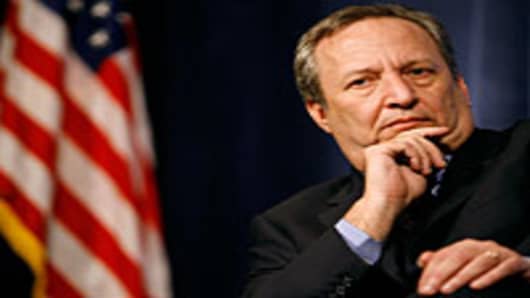Maintaining tax cuts for top wage-earners should take a back seat to other more pressing measures, White House economic advisor Larry Summers said, in a signal the administration could be digging in its heels on the issue.
In an interview with CNBC, Summers stopped short of saying the Obama administration would oppose continuing the across-the-board cuts approved by former President George W. Bush.
But he dismissed the importance of continuing the cuts for those earning over $250,000, a key part of the political battle raging in Washington. The cuts expire at the end of 2010.
"With deficits looming as seriously as they are, why is now the right moment to lock in several hundred billion dollars of tax cuts for 2 percent of the population when we could be using those revenues to strengthen incentives for investment in the country's future?" Summers said.
"I think the case is pretty clear, if you look at what the vast majority of economists are saying, (that) what will stimulate economy more are measures that are targeted at investments, it's measures that are targeted at research and development," he continued. "So I think those are the right steps forward."
Summers touted the importance of President Obama's plansto expand credits for research and development as well as full write-offs for first-year expensing for plants and equipment.
The tax question has loomed as a thorny economic issue for the administration as mid-term elections loom and expectations are high that Republicans will retake the House and have an outside chance at wresting control of the Senate.
Voters have generally expressed opposition to tax increases, even for the top earners and the Wall Street titans often demonized in Democratic rhetoric. Republicans say allowing the cuts to expire will thwart growth, and say they have the votes to block the administration.
"Why is now the right moment to lock in several hundred billion dollars of tax cuts for 2 percent of the population...?"
But Summers denied the administration was anti-business, instead maintaining that Obama was left a legacy of massive deregulation that helped trigger the current economic crisis.
"The previous administration in many areas had a philosophy that might be called 'market fundamentalism' that took the position that coming into the period before 2007, the mission of that administration in the financial areas was 100 percent to deregulate," he said. "There are photo ops of secretaries of the Treasury and other senior officials literally taking saws to books that contained regulations. That's not this administration's philosophy."
While acknowledging the danger of overregulation, he cited a "massive failure of inadequate regulation" that drove the collapse of the financial system.
"Is there a risk that overregulation could take place? Absolutely. That's why every regulation has to be reviewed separately by the Office of Management and Budget in terms of its impact on the economy," Summers said. "That's why the administration has indicated its commitment to cost-benefit analysis in regulation. So yes, of course these questions involve striking a balance and of course some people are upset that attention is being paid to consumer protection once again."
The administration has pushed through a number of consumer protection measures primarily in the banking industry, including rules that limit—in Summers' words—banks that have "computer algorithms to maximize the number of overdrafts."
"Confidence is the cheapest form of stimulus, and we've got to be very attentive to creating an economic environment in which there is confidence," he said. "But that is not an argument for a return to the policies of near total deregulation that we've seen at some point in the past."



